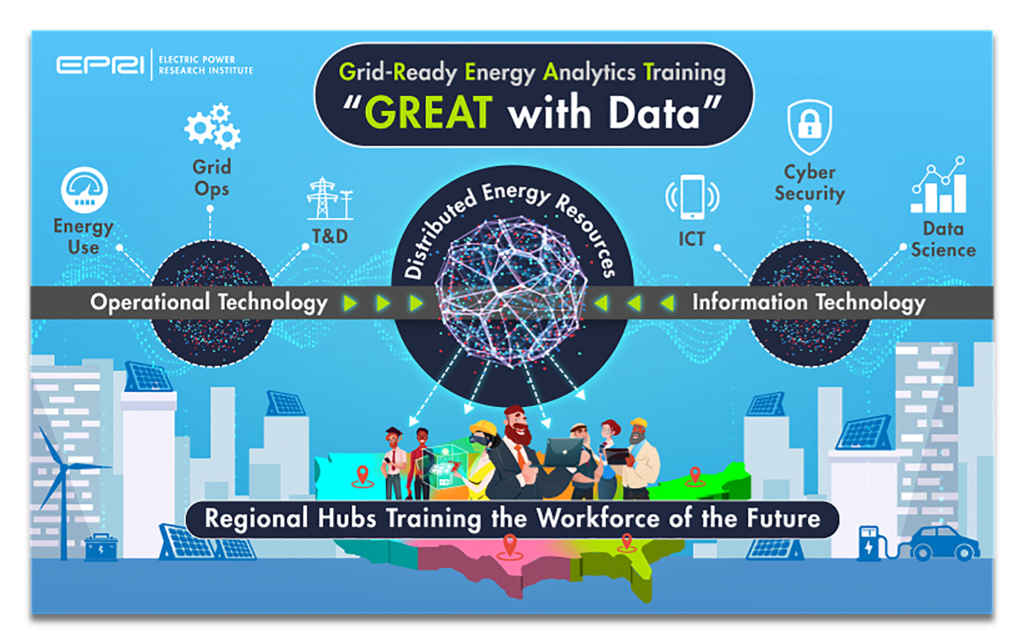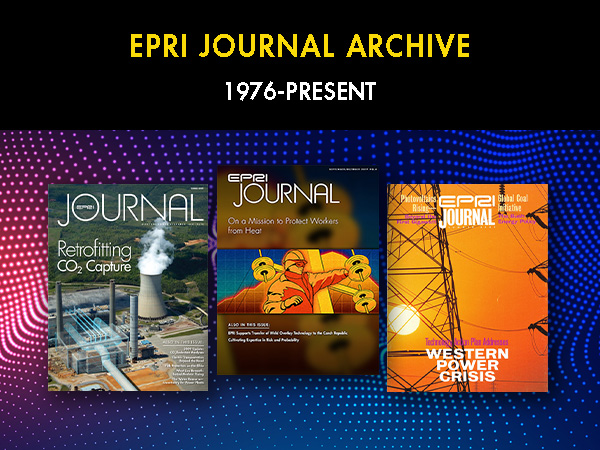Nanpeng Yu has had a unique career trajectory. Before becoming an associate professor in the Department of Electrical and Computer Engineering at the University of California, Riverside (UC Riverside), he spent nearly four years at Southern California Edison (SCE). While at SCE, Yu worked as a senior power system planner and managed the integration of more than a gigawatt of demand response resources into California’s wholesale electricity market. Yu’s professional experience helped him understand the challenges utilities face in recruiting and hiring workers with the skills needed to operate an increasingly distributed, clean, and digital power system.
“Utility hiring managers tell me that they are struggling to find people who have the skills to use new tools for analyzing the big data sets that utilities are collecting from smart meters, asset management systems, and SCADA systems,” said Professor Yu.
New technologies and digital tools are reshaping the day-to-day responsibilities of utility workers. For example, utility workers record data on handheld tablets rather than paper and clipboards and use data analytics to plan investments in future grid infrastructure. “One of the fundamental components that makes the electric system dependable is the protective relay,” said Tom Reddoch, a principal technical executive at EPRI. “Historically, protective relays were electromechanical devices and later solid-state units. Now they are digital, and new skills are needed to deploy and manage them.”
For his part, Yu is working on training more students at UC Riverside to develop the data science and power engineering skills upon which utilities increasingly rely. But Yu and other academics know that traditional undergraduate curricula need a comprehensive upgrade to adequately prepare students for tomorrow’s utility jobs.
“Cyber security is almost nonexistent in the current university power curriculum, but you don’t have to convince anybody at utilities about its importance,” said Chen-Ching Liu, a professor in the Department of Electrical and Computer Engineering at Virginia Tech University and a global expert in cyber security for power systems. “In some important areas like cyber security, curricula are five to 10 years behind what is happening in the utility industry.”
Identifying Skills Utilities Need
Liu and Yu, along with colleagues from five of the top electric power and information science universities in the United States, recently took part in a U.S. Department of Energy (DOE)-funded and EPRI-led initiative called the Grid-Ready Energy Analytics Training with Data (GREAT with Data) initiative. GREAT with Data aims to train and educate the utility industry’s future workforce to plan and manage the grid with transformative digital technologies effectively.
“GREAT with Data addresses the convergence of operational technology and information technology,” said Reddoch. “It focuses on the skills associated with collecting, communicating, storing, analyzing, and securing data and how to effectively use these skills in utility operations.”
As part of GREAT with Data, EPRI and its academic partners identified three increasingly fundamental areas to the safe, reliable delivery of electricity: data analytics, information, and communications technology; cyber security; and integration of distributed energy resources (DER).
Drawing on feedback from EPRI, utility hiring managers, and subject matter experts, professors from the five partner universities identified the skills students should acquire in each of these three areas by the time they graduate. The professors then examined 84 courses from 19 universities to determine which skills were not addressed. The analysis pointed to significant gaps in all three areas.
For example, the evaluation of data analytics curricula revealed numerous courses on machine learning and other data science topics, but most of the courses were for graduate students, not undergraduates. General data science courses for undergraduates exist but do not cover how the knowledge can be applied to power systems, leaving students to seek additional training to connect the dots.
“Most hires in the utility industry are undergraduates, not graduate students, who often go to work for consultants or get their PhDs,” said Reddoch.
As one example of a gap found in DER integration, courses contained inadequate instruction on how energy storage and flexible loads can be used to mitigate grid impacts of intermittent renewable energy. The study also revealed that there is minimal instruction about how communication technologies (such as 5G), cloud and edge computing, and artificial intelligence can be used to improve power system reliability, security, and resiliency.
The analysis of curriculum gaps is part of EPRI’s GridEd workforce development initiative, which brings together utilities, universities, government, and other power industry stakeholders to help students and utility workers acquire the skills needed in a rapidly changing industry. In 2020, with the support of the DOE, the initiative assembled course materials from 21 undergraduate- and graduate-level courses covering many of the topics identified in the curriculum gaps analysis. These materials, available on EPRI|U’s website, can be used by universities to adjust their curricula or by utilities to train their workforce. In addition, EPRI and the academics involved in the gap analysis are developing sample curriculum modules that universities can use to update their courses.
Utilities Have a Role in Changing Curricula
Getting universities to update their curricula is no simple matter. Virginia Tech’s Liu says that providing sample course modules can be helpful, though each school makes its own decisions about new curricula. “EPRI or DOE cannot direct a university to teach these courses,” he said. “Each school’s curriculum is driven by a unique set of local needs and considerations, including the skills that employers need in the workers that they hire. So there cannot be one solution for all.”
Most schools have industry advisory boards that provide input to university deans and department heads about the curriculum. Making changes to undergraduate courses also involves securing Accreditation Board for Engineering and Technology certification.
Utility engagement with universities can be beneficial, given that the job prospects for students influences decisions about curriculum changes. “If universities have active engagement from utilities and see a clear pathway for their students to obtain power industry jobs once they graduate, they may be more likely to change the curricula and invest in new professors to build more power industry-related skills,” said Reddoch.
Some utilities have deepened their relationships with universities by funding professorships, such as Liu’s position as the American Electric Power Professor of Electrical and Computer Engineering at Virginia Tech. Duke Energy has engaged with the University of North Carolina-Charlotte, Clemson University, and North Carolina State University by establishing the Center for Advanced Power Engineering Research, which develops and demonstrates grid modernization technologies while enhancing student education. Southern Company is investing $50 million to support improved training and scholarships for students at 21 historically black colleges and universities.
Utilities engaged with EPRI’s GridEd initiative can nominate universities to become affiliates, enabling the universities to receive the curriculum resources developed through the initiative.
Continuing to cultivate these relationships will be essential to develop the workforce of the future. “At the end of the day, utilities need workers with the skills to support the resilience and reliability of a rapidly changing grid, and universities want their students to find jobs and start successful careers,” said Reddoch. “The best way to accomplish that is through relationships between utilities and local universities.”
Key EPRI Technical Experts:
Tom Reddoch
For more information, contact techexpert@eprijournal.com.
Artwork by Edge Design


